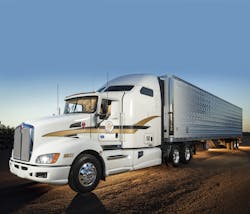COMPANY: K & J Trucking, Sioux Falls, SD
OPERATION: Refrigerated truckload carrier specializing in hauling fresh and frozen food, including meat, ice cream and produce, nationwide.
Problem:
K & J Trucking is a family-owned and operated fleet that began in 1979 in Sioux Falls, SD. Today, the company provides 48-state refrigerated service with about 110 tractors and 165 trailers from facilities in South Dakota and Oklahoma.
For several years, K & J had been following a proposed sanitary food transportation rulemaking by the Food and Drug Administration that would formalize food handling and transportation requirements all along the supply chain, including for trailer and vehicle sanitation, temperature monitoring, food security and driver training. Until very recently, these proposed regulations had not been finalized, but in 2012, Michelle “Shelley” Koch, K & J Trucking president, made the decision to prepare for the new requirements anyway.
“We were and are trying to stay ahead of the game,” she says. “We’ve been carefully following the [rulemaking process] with our shippers. We have [approximately] 50 shippers in total, about 15 to 20 we do a lot of work with. I think the regulation will probably be a bigger burden for them,” but handling and moving food is a very collaborative and cooperative business when done right.
Solution:
At K & J, staying ahead of the game meant deploying the R:COM Fleet Management solution from Blue Tree Systems. The carrier is using the system’s trailer tracking and temperature management features to provide food safety data to customers and to lower refrigeration unit fuel costs at the same time. After an initial trial period, 100% of the fleet is now using the system.
“We chose Blue Tree’s R:COM solution initially for location tracking and temperature management in transit,” Koch notes. Early on, though, reefer unit fuel costs dropped enough that she knew the system would pay for itself within the first year.
The largest cost savings come from shutting down the refrigeration units when the trailer doors are open. According to Koch, a running refrigeration unit pulls the warmer ambient air into the trailer, so if unloading is handled quickly, the trailer actually stays colder with the reefer unit turned off. “R:COM data confirms this practice protects the load, so even skeptical customers have been impressed,” she says.
“Prior to beginning, we called every customer about what we would be doing,” Koch explains. “Our drivers are the ones on the front line, though, and they were a little nervous at first because they had to explain how our system works. Now they feel like they are getting unloaded faster, and our productivity is up as a result. Our driver group is fabulous,” she adds. “Some of them have been with us for 30 years.”
The Blue Tree system also enables the fleet to see if someone is using a trailer for storage. “We can bill by the hour or by the day,” she says. There is a charge for the trailer itself and (if applicable) a charge for fuel used.
“We’ve done this now for two or three years, so people just don’t take our trailers anymore unless they are going to pay for the usage,” Koch notes. “It takes a lot of the hidden costs out of owning reefer trailers, things like fuel, damage to the trailer, and wear and tear on the refrigeration unit.”
If the temperature parameters for a load are off by 10 deg. F for 15 minutes, the system also alerts K & J so that they can notify the driver to check the load. It can also tell how many times the trailer door is opening and where, a capability Koch plans to use going forward to further enhance cargo security.
About the Author
Wendy Leavitt
Wendy Leavitt is a former FleetOwner editor who wrote for the publication from 1998 to 2021.
